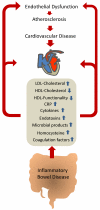Cardiovascular complications in inflammatory bowel disease
- PMID: 25642719
- PMCID: PMC4366573
- DOI: 10.2174/1389450116666150202161500
Cardiovascular complications in inflammatory bowel disease
Abstract
Over the past years, a growing number of studies have indicated that patients suffering from inflammatory bowel disease (IBD) have an increased risk of developing cardiovascular disease. Both are chronic inflammatory diseases and share certain pathophysiological mechanisms that may influence each other. High levels of cytokines, C-reactive protein (CRP), and homocysteine in IBD patients may lead to endothelial dysfunction, an early sign of atherosclerosis. IBD patients, in general, do not show the typical risk factors for cardiovascular disease but changes in lipid profiles similar to the ones seen in cardiovascular events have been reported recently. Higher levels of coagulation factors frequently occur in IBD which may predispose to arterial thromboembolic events. Finally, the gut itself may have an impact on atherogenesis during IBD through its microbiota. Microbial products are released from the inflamed mucosa into the circulation through a leaky barrier. The induced rise in proinflammatory cytokines could contribute to endothelial damage, artherosclerosis and cardiovascular events. Although large retrospective studies favor a link between IBD and cardiovascular diseases, the mechanisms behind still remain to be determined.
Figures


References
-
- Tan VP, Chung A, Yan BP, Gibson PR. Venous and arterial disease in inflammatory bowel disease. J Gastroenterol Hepatol. 2013;28:1095–113. - PubMed
-
- Singh S, Singh H, Loftus EV, Jr, Pardi DS. Risk of Cerebrovascular Accidents and Ischemic Heart Disease in Patients With Inflammatory Bowel Disease: A Systematic Review and Meta-analysis. Clin Gastroenterol Hepatol. 2014;12:382–93.e1. - PubMed
-
- Hansson GK. Inflammation, atherosclerosis, and coronary artery disease. N Engl J Med. 2005;352:1685–95. - PubMed
-
- Novacek G, Weltermann A, Sobala A, et al. Inflammatory bowel disease is a risk factor for recurrent venous thromboembolism. Gastroenterology. 2010;139:779–87. - PubMed
Publication types
MeSH terms
Substances
Grants and funding
LinkOut - more resources
Full Text Sources
Research Materials
Miscellaneous
